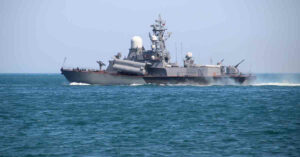
Chinese Research Vessel Headed To Maldives Sparks Security Concerns In India
January 23, 2024
Singapore’s Ship Registry Hits 100M GT With Eagle Veracruz Registration
January 24, 2024
On Tuesday, the Pentagon announced that preliminary evaluations show the second wave of strikes by the United States and the United Kingdom, backed by Australia, Bahrain, Canada, and the Netherlands, against parts of Yemen under Houthi control were effective in reducing the Houthi forces capacity to attack vessels in the Red Sea.
Eight Houthi targets were damaged in the targeted strikes, which were a reaction to a string of aggressions by the Iran-backed Houthi militia against commercial vessels in the Red Sea. These comprised installations connected to the rebels’ missile and air surveillance capabilities and an underground storage facility.
The joint strikes on January 11 that targeted ammunition stores, command and control centres, and other military installations preceded the current actions. The goal of the targeted strikes, according to U.S. defence officials and its allies, was to weaken and disrupt the Houthis’ ability to harm international trade and put the lives of maritime workers in the Red Sea and Gulf of Aden in danger. Although evaluations of the battle damage are still in progress, officials think the attacks significantly reduced Houthi capabilities.

Over 14 shipping companies have ceased operations in the Red Sea as a result of Houthi attacks, which have had a significant impact on both regional and global economies, according to the Pentagon. Since mid-November, the Iran-backed group has attacked at least 33 commercial vessels with a variety of weapons, including unmanned surface vehicles, land-attack cruise missiles, and anti-ship ballistic missiles.
Last Monday, President Joe Biden admitted that the military’s defensive actions haven’t been successful in stopping Houthi attacks. Notwithstanding these obstacles, the United States and its allies reaffirmed their dedication to reducing tensions and bringing stability back to the Red Sea while cautioning the Houthi leaders that they will protect lives and the unhindered passage of commerce through one of the most essential waterways in the world.
Under the direction of Secretary of Defense Lloyd J. Austin III, an international maritime task force called Operation Prosperity Guardian was formed, comprising more than 20 countries to protect freedom of navigation in the Red Sea and the Gulf of Aden. Unlike the defensive operations against the rebel stronghold in Yemen, Task Force 153 and the Combined Maritime Forces led this operation, which the U.S. Navy led. Responding to the airstrikes, the Houthi spokesman Yahya Saree declared that the attacks “will not go unanswered and unpunished,” demonstrating the group’s determination.
Concerns were raised by a defence officer regarding the Houthis’s unprecedented deployment of anti-ship ballistic missiles, indicating that their degree of expertise may have been influenced by Iranian technology. The United States and the United Kingdom have publicly evaluated Iran’s extensive engagement in Houthi operations. Reports suggest that Iranian advisors are present in Yemen, helping to identify targets and coordinating attacks in the Red Sea. President Biden stressed that it will take time to eradicate the Houthis capabilities to attack vessels ultimately.
Reference: Business Live
US-UK Led Strikes Have Diminished Houthi Capabilities In Yemen: Pentagon appeared first on Marine Insight – The Maritime Industry Guide
Source: Maritime Shipping News


